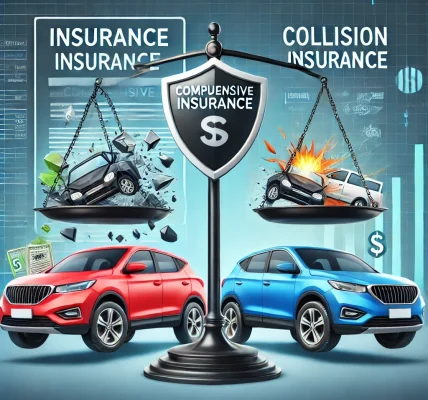Introduction
When purchasing car insurance, most people consider factors like driving history, vehicle type, and location. However, many are unaware that their credit score can also play a significant role in determining their insurance premiums.
But how exactly does your credit score impact car insurance rates? Is it fair for insurers to use this financial metric? And what can you do to improve your chances of getting a better rate? In this guide, we’ll explore the connection between credit scores and car insurance, helping you understand its importance and how to optimize your financial standing for better premiums.
Understanding Credit Scores
A credit score is a three-digit number that represents your financial reliability. It is determined by various factors, including your payment history, outstanding debts, length of credit history, and types of credit used.
How Is a Credit Score Calculated?
- Payment History (35%) – Timely payments boost your score, while late or missed payments lower it.
- Amounts Owed (30%) – High credit utilization can negatively impact your score.
- Length of Credit History (15%) – A longer credit history usually results in a higher score.
- New Credit (10%) – Opening multiple new accounts in a short period can lower your score.
- Credit Mix (10%) – A diverse mix of credit accounts (loans, credit cards, etc.) can positively influence your score.
Credit scores typically range from 300 to 850, with higher scores indicating better creditworthiness:
- Excellent (750-850) – Low-risk borrower
- Good (700-749) – Reliable borrower
- Fair (650-699) – Moderate-risk borrower
- Poor (600-649) – High-risk borrower
- Very Poor (300-599) – Very high-risk borrower
How Credit Scores Affect Car Insurance Premiums
Insurance companies use credit-based insurance scores to assess the likelihood of a policyholder filing a claim. Studies suggest that individuals with lower credit scores are more likely to file claims, leading insurers to charge them higher premiums.
Key Ways Credit Scores Impact Car Insurance
- Higher Credit Score = Lower Premiums
- Drivers with higher credit scores are seen as financially responsible and tend to receive lower insurance rates.
- Lower Credit Score = Higher Premiums
- A low credit score signals financial instability, leading insurers to charge higher rates to offset potential risks.
- State-Specific Regulations
- Not all states allow insurers to use credit scores when determining premiums. For example, states like California, Massachusetts, and Hawaii prohibit the use of credit scores in car insurance pricing.
- Insurance Score vs. Credit Score
- While related, insurance scores are different from standard credit scores. Insurance companies use proprietary models to calculate these scores based on financial behavior and risk assessment.
Arguments For and Against Using Credit Scores in Insurance
Arguments in Favor
✅ Predictive of Risk – Studies indicate a correlation between lower credit scores and higher insurance claims. ✅ Encourages Financial Responsibility – Maintaining a good credit score benefits both financial health and insurance rates. ✅ Fair Risk Assessment – Insurers argue that credit-based insurance scores help accurately price policies.
Arguments Against
❌ Not Directly Related to Driving Behavior – A person’s ability to manage credit does not necessarily reflect their driving habits. ❌ Disproportionate Impact on Low-Income Individuals – Those with financial difficulties may face higher premiums despite being safe drivers. ❌ Lack of Transparency – Many policyholders are unaware of how their credit impacts insurance costs.
How to Improve Your Credit Score to Lower Insurance Costs
If your credit score is affecting your insurance premiums, taking steps to improve it can help you secure better rates.
1. Pay Bills on Time
- Set up automatic payments to ensure you never miss due dates.
- Prioritize credit card bills, loan payments, and utility bills.
2. Reduce Outstanding Debt
- Pay off high-interest debt first.
- Keep credit utilization below 30% of your total limit.
3. Avoid Opening Too Many Accounts at Once
- Applying for multiple credit lines in a short period can lower your score.
- Space out new credit applications over time.
4. Monitor Your Credit Report
- Check for errors and dispute inaccuracies with credit bureaus.
- Use free credit monitoring services to track progress.
5. Keep Old Credit Accounts Open
- A longer credit history boosts your score, so avoid closing old accounts.
6. Diversify Your Credit Mix
- Having a combination of credit types (e.g., credit cards, car loans, mortgages) can positively impact your score.
Are There Other Ways to Lower Car Insurance Costs?
While improving your credit score helps, there are additional ways to reduce insurance premiums:
✔️ Shop Around – Compare multiple insurance quotes to find the best rates. ✔️ Bundle Policies – Combine car insurance with home or renters insurance for discounts. ✔️ Increase Deductibles – Opting for a higher deductible lowers monthly premiums. ✔️ Maintain a Clean Driving Record – Avoid accidents and traffic violations. ✔️ Take Advantage of Discounts – Many insurers offer discounts for safe driving, low mileage, and good student records. ✔️ Choose the Right Coverage – Avoid unnecessary add-ons that increase costs.
Conclusion
Your credit score plays a significant role in determining your car insurance premiums, as insurers use it to assess financial responsibility and risk. A higher credit score can lead to lower insurance costs, while a lower score may result in higher premiums.
However, not all states allow credit-based insurance pricing, and there is an ongoing debate about the fairness of this practice. Regardless, improving your credit score offers multiple benefits, from better insurance rates to overall financial stability.
If you want to lower your car insurance costs, consider improving your credit score, comparing insurance quotes, and taking advantage of discounts. By staying financially responsible and making informed decisions, you can secure affordable and comprehensive car insurance coverage.


